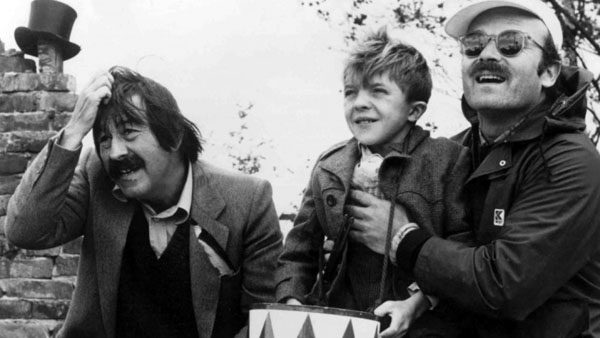German news agencies are reporting that Günter Grass, winner of the Nobel Prize in Literature in 1999, has died at the age of 87. Cinephiles will know him primarily as the author of The Tin Drum (1959)—Volker Schlöndorff’s 1979 adaptation won the Palme d’Or in Cannes and the Academy Award for Best Foreign Language Film.
“First published in 1959, the book, about a little boy, Oskar, who refuses to grow, caused a huge controversy in Germany, both because of its bawdiness and because it dealt in such an ironic and mocking fashion with the Nazi era,” wrote Geoffrey Macnab for Criterion in 2013:
Grass, who considers himself half German and half Kashubian, has been criticized severely in recent years for not disclosing that, as a young man, he was a member of the Waffen-SS. (He has dealt with this period of his life in detail only in his 2006 memoir Peeling the Onion.) For some, the revelation about Grass’s Nazi connections couldn’t help but change their response to The Tin Drum. The mockery of the Nazis in the book and the film risks seeming disingenuous. Although Schlöndorff acknowledges that it was a shock to learn about the novelist’s Nazi links, he argues that The Tin Drum contains plenty of clues about its author’s past. “This is Günter Grass’s own childhood, except he grew. The parents, the whole relationship with the uncle, the neighbors, and the whole spirit of the period—that’s what he grew up in, and that’s how he ended up wanting to partake in the war,” he says.
Both book and film are predicated on an unreliable narrator. As Schlöndorff puts it, “Oskar is not an innocent, and the book is not written by an innocent either.”
The Guardian‘s Richard Lea notes that, throughout his life, Grass produced a “steady stream of provocative interventions in debates around social justice, peace and the environment… In 1977 Grass tackled sexual politics, hunger and the rise of civilization with a 500-page version of the Grimm brothers’ fairytale The Fisherman and His Wife. The Rat (1986) explored the apocalpyse, as a man dreams of a talking rat who tells him of the end of the human race, while 1995’s Too Far Afield explored reunification through east German eyes… Speaking to the Paris Review in 1991, Grass made no apology for his abiding focus on Germany’s difficult past. ‘If I had been a Swedish or a Swiss author I might have played around much more, told a few jokes and all that,’ he said. ‘That hasn’t been possible; given my background, I have had no other choice.'”
“It is hard to imagine the literary giants of the Romanisches Café in Berlin tramping up and down tenement stairs with election manifestos, or toiling from hall to hall to endorse the candidates of a political party,” wrote Neal Ascherson in the London Review of Books in 1985. “But this is what Günter Grass has done, on behalf of the German Social Democrats, and done to considerable effect…. [T]he strongest motive of all for Grass’s political activity seems to be to do with his own approach to literature—his violent contempt for a creativity which attempts to keep its hands clean of the mire.”
Updates, 4/14: “I envied him his artistic gift almost more than I admired him for his literary genius,” writes Salman Rushdie for the New Yorker, recalling the time he met Grass in 1982. “How wonderful, at the end of a day’s writing, to walk down the street and become a different sort of artist! He designed his own book covers, too: dogs, rats, toads moved from his pen onto his dust jackets…. Later, when people threw slurs at him—Nazi, anti-Semite—I thought: let the books speak for him, the greatest anti-Nazi masterpieces ever written, containing passages about Germans’ chosen blindness toward the Holocaust that no anti-Semite could ever write.”
Stephen Kinzer for the New York Times: “His longtime publisher, Gerhard Steidl… said he drank his final schnapps with Mr. Grass eight days ago while they were working together on his most recent book, which he described as a ‘literary experiment’ fusing poetry with prose. It is scheduled to be published in the summer. ‘He was fully concentrated on his work until the last moment,’ Mr. Steidl said.”
The TLS gathers a collection of its reviews under one URL.
Updates, 4/25: John Irving in the Globe and Mail: “I was 19 or 20 when I read The Tin Drum; I hadn’t known it was possible to be a contemporary novelist and a 19th-century storyteller…. I learned from my favourite 19th-century writers that I wanted to be a certain kind of novelist—like Dickens and Hardy, like Hawthorne and Melville. I learned from Grass how to do it.”
“The fact that Germany has become a ‘normal’ country was in large part thanks to Grass,” argues Jonathan Steele in the Guardian.
For news and tips throughout the day every day, follow @KeyframeDaily. Get Keyframe Daily in your inbox by signing in at fandor.com/daily.




